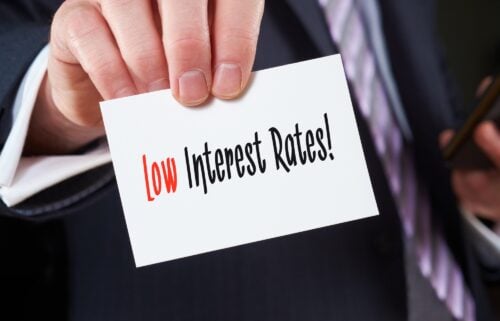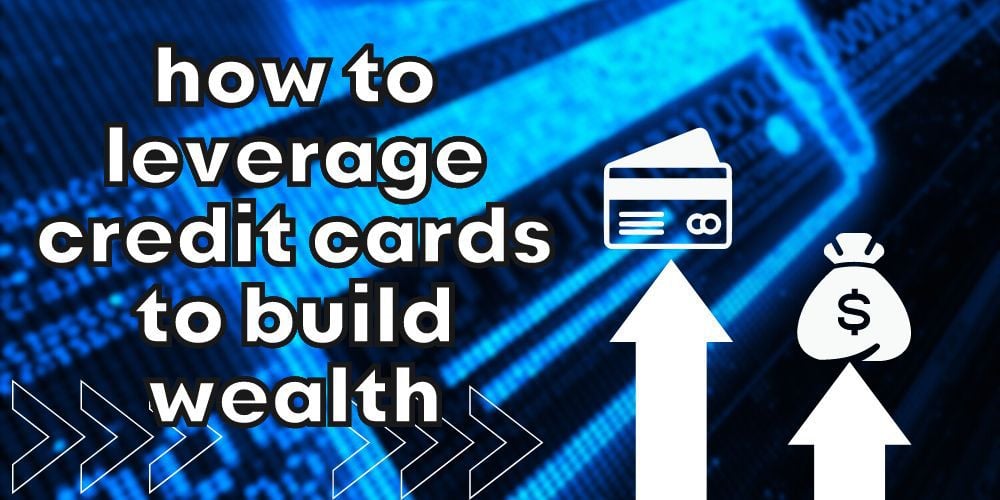An excellent credit score can help you get the best credit cards on the market. But once it’s in your hands, is there more that can be done with it? We share below some tips on how to leverage credit cards to build wealth and why credit cards are a two-edged sword sometimes.
How to Leverage Credit Cards to Build Wealth?
Credit cards can be used for wealth creation by accumulating cash rewards, using low-rate promotions, consolidating debt, or even indulging in retail arbitrage.
The key feature that separates them from other forms of debt is that they are collateral free and even offer rewards.
All that is needed is regular repayment of the amount owed.

Moreover, with higher credit limits, the rewards and spending limits also increase. What better way is there to leverage debt?
Below, we explain how to leverage credit cards to build wealth in simple ways.
Cash Rewards
If you have a cashback rewards credit card account, use it for daily purchases and collect as much as possible instead of using a debit card.
This way, unavoidable, everyday purchases will help earn money, which can be used for further spending.
Some examples of such payments could be gas bills, groceries, dine-outs, vacations, going to the movies, paying phone and internet bills, etc.
Apart from this, some cards have special reward deals and tie-ups with certain companies. For example, if there is a gas station that you frequent, check if they have a rewards card that offers cashback.
This way, rewards can be accumulated each time your gas gets topped up.
Similarly, major online retailers like Amazon have co-branded credit cards that offer discounts on every purchase through their sites.
The trick is to identify places where you are spending regularly and get rewards cards applicable specifically to them.
Low-Interest Rate Promotions
For people with a good credit score, card companies often come out with low-rate promotions such as 0% APR for six to 18 months.
Acquire such cards whenever they are available. Move regular purchases onto them and invest the cash saved elsewhere to earn returns.

The only thing to remember here is not to start spending too much. Ensure the total bill is not so high that it can’t be repaid after the period.
Secondly, invest in low-risk avenues such as term deposits or fixed-income bonds so that the money is readily accessible when it’s time to pay back.
Keep in mind that some cards even have clauses to pay interest on a deferred basis for pending debts if they are not paid back when the period expires.
Property
For those who own real estate, upgrading it increases the value manifold. Credit cards can be used as a cash flow tool to fund purchases for such upgrades.
This is a great way to leverage debt in an investment property, especially if it is about to be rented.
The revolving credit line will help reduce your outlay on renovations, and the dues can be paid back from the proceeds of the sale without spending a dime from your pocket.
Note that the ROI on this depends on several factors, including materials used, appliances installed, quality of workmanship, and so on.
However, some reports suggest that it could be as high as 83% for kitchen renovations and more than 60% for bathroom makeovers.
Retail Arbitrage Using Credit Cards
Simply put, retail arbitrage is buying for cheap and selling for more. This method can work if you know of thrift stores or websites where cheap but quality items are available.
Simply buy them and put them up for sale on eBay and Etsy, where they may sell for a profit.

The only snag is – buying for cheap still requires spending money. This is where leveraging credit cards come in.
If the item can be sold during the card repayment grace period, it is possible to profit from the arbitrage with zero out-of-pocket investment.
Related: Does Sephora Have A Credit Card In 2023?
Debt Consolidation
If there are multiple debts at high-interest rates in your name, it might be wise to get them together under a single credit card with a low interest rate.
The idea is to use the card and pay off all other loans.
Typically such cards come with an introductory 0% (or very low) APR for six to eighteen months.
That gives the holder some time to pay off the amount to the credit card company.
This is an excellent idea, but there are a few hiccups to consider.
Firstly, such cards are usually only available for people with good credit scores. With multiple debts running, this might be a challenge.
If payment defaults have happened in the past or the loans are very recent, it is unlikely that such a promotional offer will come your way.
Another problem is that such balance transfers should not become an excuse to overspend because the repayments have stopped.
Profligate spending might get you into a much bigger soup when the promotional period expires.
This is because credit card interest rates are usually higher than most other forms of debt. Once the offer is over, those are the rates to be paid.
Lastly, other fees might be associated, like balance transfer charges, annual fees, origination and closure costs, etc.
These can potentially reduce and even negate any benefit from the lowered interest rates received.
Related: How Long Does a Credit Freeze Last?
Sign On Bonuses
High-end cards such as the Capital One Venture Rewards Credit Card and Chase Sapphire Preferred® Card offer big sign-on bonuses.
This could be a great way to make extra money by simply using the card.

Note that these benefits are usually predicated on a minimum spending requirement, which is usually a very big amount.
Unless you can spend as much money, do not opt for these cards because they might have clawback or annual fees associated with them.
How Do People Get So Deep in Credit Card Debt?
While no one wants to get into debt, the fact is that nearly 60 mn American households have outstanding balances on their cards every month.
In some cases, the reason is uncontrollable expenses – medical bills, emergency expenses, etc.
At other times, it could simply be a case of regular expenses like groceries and shopping bills adding up too quickly to notice and spiraling out of control.
We talk in more detail about why this happens.
Credit Limit Higher Than Earning
At one time, there were no cards, only cash. Spending had to be restricted to whatever was in hand because there was no other option.
Credit cards changed all that by providing two key benefits: the ability to spend more than earnings and a grace period for paying back.
Unfortunately, it is hard to keep track of spending when the bank account is not getting debited each time a payment is made.
Moreover, the extended payback period gives the illusion that the bill is “tomorrow’s problem.”
Both of these issues cause people to lose sight of fiscal prudence, causing debt to accumulate.
A secured credit card can come in handy in such cases. These cards are backed by a deposit made by the holder, and the deposit amount decides their limit.
Spending on these cards can never exceed the amount already in the bank. Hence they are at a lower risk of default.
Rewards
Cash backs and perks are favorite marketing tools for card companies. They are always designed to get the cardholder to spend more.
Unfortunately, they are usually not worth the money spent on them.

The interest charges that would have to be paid if the required spending becomes too high will always overshadow the benefits of these rewards.
The best advice is never to try and collect them – let them come on their own with things you would buy anyway.
Cardholders Think Minimum Payments Are Enough
The myth of minimum payments is that doing them would protect the card owner from interest charges and other fees.
Unfortunately, the balance that gets built up due to non-payment of the remaining balance often spirals out of control.
Once that starts happening, it can cause a bigger dent in your credit reports than one or two missed payments.
It is always best to pay back as much as possible each month, not just the minimum amount.
Too Many Cards
The average American has four credit cards. Owning even these many can be challenging to manage.
Due dates, payment schedules, interest rates, payment charges, reward points – keeping track of all of it can be overwhelming.
It is easy to make mistakes in payment, and the more they happen, the bigger the hole that gets created. To avoid this, make sure only to keep as many credit cards as are easy to track in the time available to you.
Emergency Expenses
Sometimes, there is no other way to arrange money quickly in an emergency. Credit cards are the only option.
Unfortunately, they are the worst way to pay hefty amounts, especially if the money cannot be re-paid soon.

Interest rates and late fees on cards can be nightmarishly high.
The best option in such situations is to borrow money as early as possible from a more credible source and pay back the card in full.
Does a Black Card Mean You’re Rich?
Yes, black cards are usually offered only to the wealthiest customers of credit card firms.
There is no single black card out there.
It is an umbrella term applied to all highly exclusive cards from credit card companies like Visa, Mastercard, American Express, etc.
Black cards usually offer excellent perks and extremely high or sometimes even unlimited credit.
However, the evaluation criteria for owning them is to have extremely high incomes, apart from a history of big spending.
Moreover, the credit scores required to get them are among the highest.
Is $5,000 Credit Card Debt a Lot?
Yes, $5,000 credit card debt can be a lot, considering that 52% of Americans have less than $2,500 balance on theirs.
However, it is not a completely unmanageable amount. The average card debt in the US is $6,194, so $5,000 is at least lower than that much.
The important thing is to get down to managing and reducing this burden at the earliest.
Do Millionaires Have Credit Cards?
Yes, millionaires also have credit cards. They often get exclusive ones with high/unlimited credit and difficult entry requirements.
For example, the AmEx Black Card requires a total charge across other AmEx cards of over $100,000 a year to even be eligible (reportedly).

Such cards are usually invitation only and cannot be applied for directly.
What Is the 72 Rule in Wealth Management?
The rule of 72 is a simple way to estimate how much time a fixed-rate investment will take to double.
Simply divide 72 by the rate, which will give you the number of years your money will take to double (in approximate terms).
For example, a 10% interest rate should double in 72/10 = 7.2 years, per this rule.
This is a close approximation; the actual number is 7.3 years.
When using it, remember that the rule of 72 becomes less accurate as the rate increases and the time to double decreases.
For a 50% return rate, the time predicted is 72/50 = 1.4 years, whereas, in reality, the principle will take 1.71 years to doble.
What Is the 20/10 Debt Rule?
The 20/10 debt rule is a simple way to assess your current loan obligations and determine if they are too high.
It states two things:
- Monthly debt payments should not exceed 10% of net household incomes.
- The yearly repayment for these loans must be lower than 20% of net earnings.
While using the 20/10 rule, a critical point is that housing debt needs to be excluded from the calculations.
Also, net household income is what you get in hand, post taxes and deductions.
As an example, if the net household income of a family is $50,000, then:
- Payments per month should be <$500
- Annual total repayment should not exceed $10,000
Remember that this is more of a guideline than a rule. It may not always be a good measure to consider.
Final Thoughts
Credit cards aren’t always a black hole of debt and misery – with a good credit score, you can get cards that help build wealth.
Reward points, sign-on bonuses, using cards to finance property makeovers, and other tips can help you earn more money from them.
Unfortunately, credit cards often end up causing debt because they offer easy money and a grace period to pay it back.
With simple steps like regular, on-time, and complete repayments, not running after reward points, and keeping as low a balance as possible, these problems can be avoided.
You might also like:


 Tags:
Tags:










